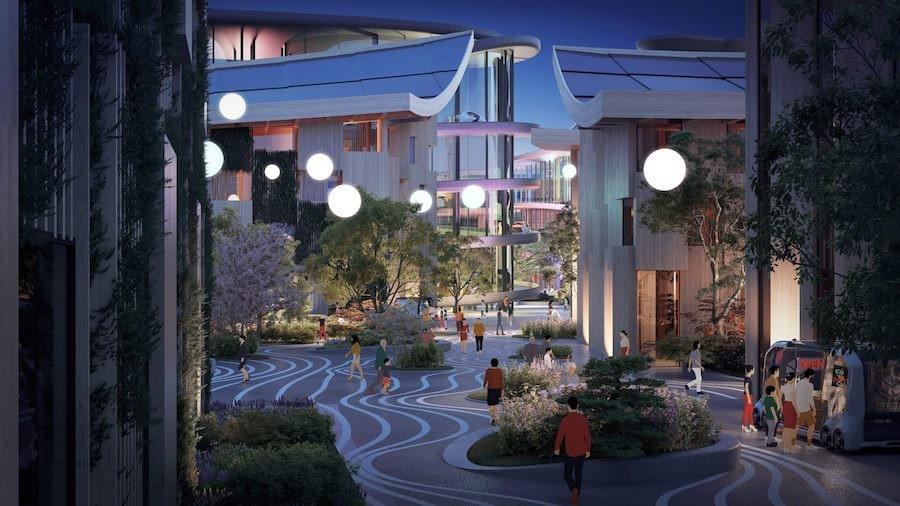A new wave of smart applications and interconnected living assistants is changing the way we live and approach everyday activities in today’s ever-expanding and ever increasingly connected technology-driven world. From utility appliances such as intelligent fridges and air conditioners to personal assistants like Amazon's Alexa and integrated smart home security systems the tools and opportunities for efficient living grow each and every day. All of these concepts are just part of what are considered when we talk about “Next Generation Destinations”, or the future of urbanism, with some major projects being undertaken today by some of the largest companies around the world.
Toyota Woven City

Woven City plaza (Credit: Toyota)
In Japan lies a former car factory that Toyota has said it will transform into a 175-acre “prototype city of the future”, where testing autonomous vehicles, innovative street design, smart home technology, robotics and new mobility products on a population of real people who would live there full-time. Toyota is calling the site “Woven City,” a reference to weaving together three different types of streets or pathways, each for a specific type of user: one street for faster vehicles only, a second would for lower-speed personal mobility vehicles like bikes and scooters as well as pedestrians, and a third for pedestrians only in a park-like promenade. These three street types would weave together to form an organic grid pattern and help accelerate the testing of integrated technical autonomy.
Toyota envisions these interconnected streets serving a variety of functions, from providing typical mobility services like ride-sharing and carpooling to less-typical purposes like serving as mobile offices, retail spaces, medical clinics, hotel rooms and more. These vehicles could also congregate in centrally located plazas within Toyota’s prototype city to sell goods or provide services.
Within the Smart City limits residencies would also be equipped with smart home technology such as in-home robotics to assist with daily living. The homes will use sensor-based AI to check on occupants’ health, take care of basic needs and enhance daily life, building an opportunity to deploy interconnected technology with integrity and trust – a major concern for many people today.
Sidewalk Labs

Sidewalk Labs Toronto, a sister company of Google (Credit: Sidewalk Labs)
Google launched Sidewalk Labs to test new and emerging technologies across a 12-acre stretch of land on the Toronto waterfront with the aim to create a high-tech utopia. A “city within a city”, Sidewalk Labs is an experiment with innovations like self-driving cars, public Wi-Fi, new healthcare delivery solutions and other city planning advances that modern technology makes possible.
The plan includes:
- Ten new buildings of mixed-use development consisting primarily of thousands of new residential units, as well as retail and office spaces, all made from mass timber
- A proposal to extend the city’s light-rail system to serve the new neighbourhood
- Redesigning streets to reduce car use and promote biking and walking
- Installation of public Wi-Fi in addition to other sensors to collect “urban data” to better inform housing and traffic decisions amongst other key details of daily life
- Proposal to reduce greenhouse gases by up to 89 percent
Sidewalk Labs says it will spend $1.3 billion on the project in the hopes of spurring $38 billion in private sector investment by 2040.

Willow Campus Expansion (Credit: Facebook)
Facebook is looking to expand beyond its Silicon Valley campus. A multi-use complex with stores, a pharmacy and 1,500 housing units, the expansion will be dubbed "Willow Campus" and will include 125,000 square feet of retail space and be entirely open to the public. It is on the site of the former Menlo Science & Technology Park, adjacent to the company's current headquarters designed by Frank Gehry. Facebook envisions that the first part of the project, including the retail, office, housing and grocery space, will be completed by 2021.
Like many of these projects, EDGventures is working with government entities to manage and coordinate some of the most engaging next generation destinations to date. Merging government groups, SOEs and private enterprises into true new age developments, EDGventures will be working from the ground up to build the latest technical infrastructure into ground breaking new destination programs and push industry innovation and new standard to create hyper-connected destinations.
